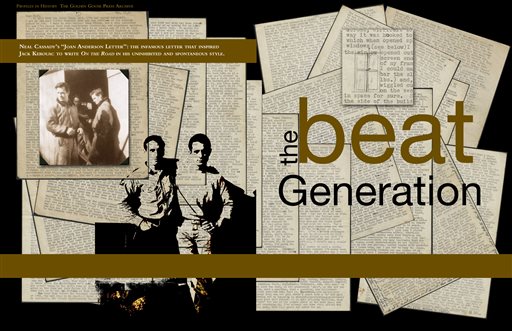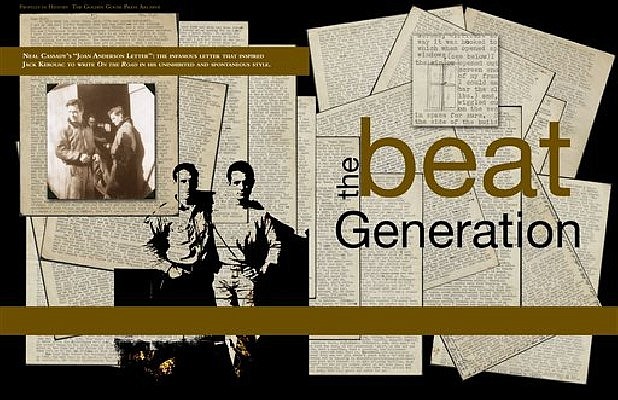 This image provided by the Profiles in History auction house shows the cover of an auction catalog, featuring several pages of what has become known as "The Joan Anderson Letter," some 16,000 Benzedrine-fueled, stream-of-consciousness words written by Neal Cassady to his friend Jack Kerouac in 1950.
This image provided by the Profiles in History auction house shows the cover of an auction catalog, featuring several pages of what has become known as "The Joan Anderson Letter," some 16,000 Benzedrine-fueled, stream-of-consciousness words written by Neal Cassady to his friend Jack Kerouac in 1950.LOS ANGELES - When a letter credited with inspiring Jack Kerouac to create a new literary genre suddenly surfaced, no one was happier than an 86-year-old poet and playwright from New Jersey.
For more than 50 years, Gerd Stern had been wrongly accused of tossing what Kerouac called "the greatest piece of writing I ever saw" over the side of a houseboat.
"Yes, I'm the guy who dropped the letter off the boat, but of course I didn't," Stern, laughing heartily, said after The Associated Press reported Sunday that the 16,000-word screed to Kerouac from his friend and literary muse Neal Cassady was found intact last week in a house in the San Francisco Bay Area.
"At least 12 literary publications through the years have accused me," Stern said. "People have written to me and damned me for this. After 50 years, it's a blessing to be vindicated."
Cassady, who wrote the letter over three amphetamine-fueled days in 1950, sent it to Kerouac just before Christmas.
After he read it, Kerouac would say later, he scrapped an early draft of "On The Road" and rewrote it in a similar stream-of-consciousness style. The result was a literary classic and a new style of prose called Beat literature.
If Stern hadn't dropped the letter off that boat, Kerouac told The Paris Review in 1968, the writing would have transformed his car-stealing, marijuana-dealing, con-man friend Cassady into a literary giant.
Stern said Monday that Beat poet and Kerouac friend Allen Ginsberg sent him the letter sometime in the 1950s, hoping he could get it published by Ace Books, for which Stern was a literary agent.
"It was part of a stash of about two and a half feet of books and manuscripts that Allen had collected from all of his buddies," he said, adding he sent them all back but one - William S. Burroughs' novel "Junky," which was published.
"Soon thereafter Allen started that rumor," he said about the account that he had thrown the letter overboard.
What really happened? Ginsberg sent the letter to Richard Emerson at Golden Goose Press and he didn't bother to read it.
When Emerson folded Golden Goose, he gave his archives, including the still-unopened letter, to a business associate who took the material home.
There it stayed until Los Angeles performance artist Jean Spinosa was cleaning out her late father's house two years ago. The auction house Profiles in History is putting the archive up for sale on Dec. 17.
Profiles in History released a snippet of the letter to The Associated Press on Monday that hints at Cassady's abilities as a wordsmith.
"I am fettered by cobwebs, countless fine creases indelibly etched on the brain," he tells Kerouac in a paragraph that includes strikeovers and penciled corrections of a couple misspelled words.
"There are no unexplored paths in my mind and few that are not entangled in the weave of my misery mists. It is but gentle fog thru which I navigate and make friendly by constant intimate communion."
Only one question remains: Why did Ginsberg say Stern tossed the letter?
"At the best he forgot that I gave it to him," Stern said. "At the worst he said it just to stick it to me.
"But it doesn't matter now," he added with a chuckle. "Allen's dead. Jack's dead. Neal's dead. But I'm still alive."
